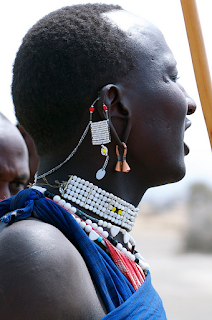Stretching Earlobes from Africa to America
The tradition of elongating earlobes has stretched from Africa to America. In the African Maasai tribe the slow and steady method of stretching earlobes is the method used.
Stretching Earlobes from Africa to America
Ear piercing and the stretching of earlobes are the first stage of initiation towards adulthood in traditional African Maasai (Masai if you live in Tanzania) culture.Piercing and stretching earlobes are considered beautiful to most Maasai. Women and men are initiated during the Eudoto-oo-inkiyiaa cartilage and Enkigerunoto-oo-inkiyiaa earlobe stretching ceremonies.
In 2013, Kenya began a campaign toward the Maasai of educating the tribe on the negative connotations of ear stretching and an upper cartilage piercing. Some Kenyan officials believe tribalism is hurting Kenya and the more mainstream an individual is the more likely they can absorb into conventional society.
While Kenya began a campaign of cultural everydayness with the Maasai, flesh tunnels and flesh plugs, have become more visible on the streets of European mainstream society.
Ear stretching and ear cartilage piercing with 1, 2, 3, 4, 5 and up piercings are common. Ear piercing kits, expanders, stretchers and even tips on perfectly stretching your ears are sold online; ear art heritage has literally stretched from Africa to America.
Ear stretching and ear cartilage piercing with 1, 2, 3, 4, 5 and up piercings are common. Ear piercing kits, expanders, stretchers and even tips on perfectly stretching your ears are sold online; ear art heritage has literally stretched from Africa to America.
Everyone practices the art of ear stretching and piercing for many different reasons, beauty has always been in the eye of the beholder.
Hopefully, the traditional culture and customs of the Maasai are not limited to working in African tourism where they display their culture to visiting tourists. Maasai traditions have undergone some changes in the past few decades; their strong social traditions remain intact.
Hopefully, the traditional culture and customs of the Maasai are not limited to working in African tourism where they display their culture to visiting tourists. Maasai traditions have undergone some changes in the past few decades; their strong social traditions remain intact.
 |
| Beautiful Kenyan woman with stretched earlobes |
There are three major ways to stretch ear lobes, gradually, scalpelling and using weights
You can gradually
stretch the skin using different sized tapers normally a 1mm increase every
four weeks. DIY kits are more widely available and there is a much greater
choice of jewelry, skin cleaning and moisturizing products and tips on how to avoid
blowouts and infection.
Scalpelling and dermal
punch procedures have a higher risk of infection because of the level of damage
to the skin compared to ordinary piercing needles.
A dermal punch or a biopsy punch is a large gauge-piercing needle used to remove a circle of skin or tissue usually on a cartilage part of the ear. Scalpelling is performed by using a scalpel to cut a slit into the skin, and flesh is removed. Both procedures can cause thin lobes. The larger and heavier the earplug will cause the ear lobe to stretch further.
A dermal punch or a biopsy punch is a large gauge-piercing needle used to remove a circle of skin or tissue usually on a cartilage part of the ear. Scalpelling is performed by using a scalpel to cut a slit into the skin, and flesh is removed. Both procedures can cause thin lobes. The larger and heavier the earplug will cause the ear lobe to stretch further.
Using ear weights stretches
the part of the ear lobe where the weight is hanging from and stretches the
earlobe unevenly. Most people use ear weights in combination with earplugs. Ear
weights are not meant to be worn overnight or all day long. Ear weights are designed
for use a few hours a day.
There is a point of
no return but it varies. A stretched piercing can shrink back to its original
size but this depends on several factors including the length of time taken to
stretch and the elasticity of the skin. In some cases, if you stretch too fast
or by too much, the lobe can split since ear lobes are made of skin and fat but
they are sensitive organs.
 |
| Using ear weights stretches the ear lobe |







